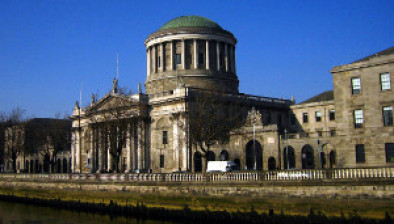NI High Court: Lay litigant seeking £300m from Law Society, PSNI and 22 others has case struck out

Northern Ireland’s High Court has struck out an action as being doomed to fail and frivolous where the lay litigant plaintiff was seeking a combined £300 million for alleged failures by his legal representatives and the police to enforce a court order.

About this case:
- Citation:[2022] NIMaster 12
- Judgment:
- Court:NI High Court
The court also rejected his claim that the Law Society for Northern Ireland was vicariously liable for the alleged tortious acts of his solicitors.
Background
This was series of six “strike out” applications by the defendants under Order 18 Rule 19 (1)(a) of the Rules of Court of Judicature (NI) 1980, alleging that the plaintiff had no reasonable cause of action, and that his case was an abuse of process.
The strike out motion was in relation to two writs against the various defendants. The first writ was against 19 defendants, and related to a court order issued in 2015 in favour of the plaintiff for “his family and his family’s protection”. The second writ was against five defendants, on largely the same grounds.
Writ 2021 No.21954 claimed £250 million for, inter alia, gross professional negligence, gross professional malpractice, gross misfeasance in public office, abuse of position, and discrimination and prejudice towards the plaintiff.
Writ 2021 No.28659 issued on the 29 March 2021 against five defendants claiming £50 million in respect of essentially similar allegations. Each writ contained a “statement of claim” setting out a combined total of 49 heads of claim.
The plaintiff claimed that the PSNI and PPS “refused to recognise that order, refused to enforce it properly and instead allowed its recipient [his brother] to ignore and to breach it at will”.
He claimed that this caused him to endure a “campaign of humiliation and degrading treatment at the hands of the order recipient”. Further, he argued that the relevant bodies either refused to take action or exonerated those involved from all blame and responsibility.
He also believed that his legal team failed to do their job, and expected a later lawyer to obtain clarification of the existing order so that the PSNI and PPS would properly enforce it.
The plaintiff’s submissions
The plaintiff served written submissions accompanied by various exhibits on 7 September 2022 in reply to the strike out applications. This was followed by an “addendum” on 15 September 2022. He then served “particulars (amended)” on 16 November 2022. Finally, on 30 November 2022, two hours before the hearing, he submitted an application for an extension of time.
He claimed the defendants’ strike out applications were an abuse of court process, intended to frustrate and undermine/harm the proper prosecution of the action.
He indicated that the evidence proving the case against all 24 defendants extended to several volumes, but could be proven irrefutably.
He claimed that some of his legal representatives were given evidence of criminality, including the abuse and exploitation of his disabled brother, but that they did not refer to these in court. He also stated that they did not present the case in the way he hoped.
He claimed the PSNI did not take any action on these claims, and their investigation was flawed and corrupt.
The plaintiff also made a complaint to the Law Society of Northern Ireland about his solicitors. He alleged that the Law Society was vicariously liable for their actions.
The defendants’ submissions
In essence, the defendants argued that the plaintiff was “aggrieved” at the efficacy of the court order he received. However, counsel stated that the plaintiff did not identify a cause of action known in law in the jurisdiction.
Further, the plaintiff did not identify any statutory provision that imposes an actionable duty on the Law Society. The Law Society Council has a power to impose sanctions on a solicitor for inadequate professional services but, they argued, “that power does not give rise to a duty of care to a complainant nor is it actionable at the suit of the complainant”.
Consideration
Ultimately, the court agreed that there was no basis for a submission that the Law Society was vicariously liable for the tortious acts of solicitors. The court found the pleading to be “entirely defective”, and the claim had no prospects of success against the Law Society and should be struck out.
The court further noted that the High Court has inherent jurisdiction to strike out proceedings as an abuse of process, without offending against Article 6 ECHR, as a right to a fair trial does not require a plenary trial where the plaintiff clearly does not have a case to make.
Conclusion
The court accepted that this case arose ultimately from a family dispute, which clearly caused the plaintiff a significant degree of anxiety and upset.
However, “even on the most generous of interpretations”, and allowing for his lack of legal representation, the writ, statement of claim, and amended particulars, all fell “hopelessly short of disclosing anything that could resemble a formal court pleading or disclose anything amounting to a reasonable cause of action”.
On balance, the court found that an adjournment to allow the plaintiff to seek to remedy the pleadings would only prolong the case, and would “unrealistically heighten the expectations of the plaintiff and postpone to another day the understandable disappointment he will feel when inevitably he is eventually informed, he has no claim and has wasted time, effort and money pursuing an utterly hopeless case”.
As such, the court granted the applications of the defendants who brought strike out applications. The court struck out the claims against these defendants on the grounds that the actions disclosed no reasonable cause of action, and were doomed to fail.
The court concluded that they were so frivolous that to put them forward would be an abuse of process of the court.
The court therefore also struck out the actions against all of the remaining defendants in their entirety, including those who had not yet brought similar “strike out” applications.










